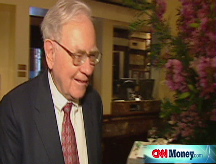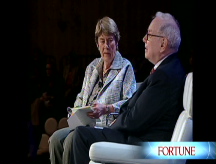Buffett's paper losses pile up
Berkshire was on the wrong side last year of bets on corporate defaults and stock prices, but so far there has been little cash cost.
 |
| Berkshire suffered big paper losses in its derivatives book in 2008, Warren Buffett said Saturday. |

NEW YORK (Fortune) -- Derivatives, the investments Warren Buffett famously scorned as "financial weapons of mass destruction," are proliferating at Berkshire Hathaway. But so far, there are no signs Berkshire risks a blowup.
Buffett, CEO of the Omaha-based conglomerate, said Saturday in his annual letter to shareholders that Berkshire's (BRKA, Fortune 500) holdings of derivatives -- essentially bets tied to the performance of financial assets such as stocks, bonds or currencies -- expanded for the third straight year.
With economies slowing and stock prices tumbling, and markets growing ever more fearful, the price of being on the wrong side of a growing derivatives book is soaring, at least on paper. The losses Berkshire would have theoretically suffered to settle its derivatives contracts at year-end prices more than doubled in 2008, to $14.6 billion.
These losses reflect accounting conventions rather than actual cash payouts. Buffett has long warned that Berkshire's derivatives dealings could lead to substantial paper losses, such as the fourth quarter's $4.6 billion mark-to-market hit. None of this, he has said, will cause him to lose a wink of sleep.
Even more important, the letter offered few reasons for shareholders to worry that the derivatives bets are creating demands on the company's financial resources.
Berkshire hasn't faced substantial cash calls from its trading partners, Buffett said. That's a key consideration for investors scarred by last fall's collapse of AIG (AIG, Fortune 500), the big insurer that was nearly forced into bankruptcy when it was called upon to produce billions of dollars in collateral after a ratings downgrade.
"Only a small percentage of our contracts call for any posting of collateral when the market moves against us," Buffett said in the letter. "Even under the chaotic conditions existing in last year's fourth quarter, we had to post less than 1% of our securities portfolio."
Buffett has often said he ignores quarterly shifts in the value of his derivatives bets, preferring to focus instead on the upfront cash they generate for Berkshire's investment portfolio and their profit potential. He pointed out in Saturday's letter that the company holds some $8 billion in premiums on its derivatives dealings -- much of which it can freely invest between now and when the contracts come due, which in some cases isn't until 2027.
The allure of an underappreciated investment opportunity evidently is enough to overcome Buffett's well known qualms about the risk of derivatives. In his 2002 letter to shareholders, he likened them to "time bombs" that threaten the stability of the financial system.
"Considering the ruin I've pictured, you may wonder why Berkshire is a party to 251 derivatives contracts," Buffett said in Saturday's letter. "The answer is simple: I believe each contract we own was mispriced at inception, sometimes dramatically so."
Berkshire's derivatives fall mostly into two categories: those that use options to bet on an increase in stock prices over periods as long as 20 years, and those in which Berkshire promises to pay when bondholders face credit losses.
The first category -- covering Buffett's sale of so-called equity put options -- has so far drawn more attention. Under the arrangement, Berkshire has sold $37 billion worth of contracts that give the holder the right, though not the obligation, to sell a basket of stocks to Berkshire at a point in the future.
These options, which cover the S&P 500 and three foreign stock indexes, are exercisable only when they expire, between 2019 and 2027. The options will be profitable for the buyer only if stock prices on the expiration date are below their level on the day when the contract was written - which is to say Berkshire is betting that stock prices will rise over the next decade or two.
While Buffett has indicated he still likes his odds -- normal inflation alone might be expected to account for substantial stock price appreciation over the course of a decade or more -- the plunge of stock prices since last fall means the contracts are currently in the money for the buyers, even if they aren't immediately exercisable. That is why Berkshire's paper liability on those contracts rose to $10 billion at year-end, from $6.7 billion at the end of the third quarter and $4.6 billion a year ago.
Buffett stressed in the letter that while Berkshire's so-called notional exposure to losses on those contracts is $37 billion, it's exceedingly unlikely that the company will actually face such a staggeringly large obligation. If, for example, the contracts expire with the reference stock indexes 25% below their level on the day the deals were agreed to, Buffett said, Berkshire would have to pay out roughly $9 billion.
The outlook on the second big derivatives bet -- the company's promise to make payments when certain companies default on their bonds -- has clouded over the past year.
Buffett wrote last year that this portfolio -- comprising some $7 billion of contracts that require Berkshire to pay if companies in various high-yield bond indexes experience credit losses -- looked likely to be profitable on an investment basis.
But with the economy having turned down sharply, the outlook for this portfolio has soured. Thus the $1.8 billion liability Berkshire had booked for 2007 on the high-yield index credit default obligations grew to almost $3 billion by the end of 2008 . And the sharp slowdown in economic activity in the early part of 2009 has further dimmed the prospects for this bet.
"Losses have accelerated sharply with the mushrooming of large bankruptcies," Buffett wrote. "In last year's letter, I told you I expected these contracts to show a profit at expiration. Now, with the recession deepening at a rapid rate, the possibility of an eventual loss has increased."
A third category covers so-called credit default swaps that Berkshire has written on individual companies, in a promise to compensate debtholders in the event of a default. Berkshire moved into this business in 2008 and ended up writing $4 billion in business, signing up 42 companies to garner $93 million of premiums annually.
But Buffett's foray into the CDS arena, the site of much controversy due to derivatives' perceived role in the financial meltdown of the past year, appears likely to be short lived. It seems that other players' efforts to reduce their own risks are constraining Buffett's ability to play on his terms.
"We are unlikely to expand this business to any extent because most buyers of this protection now insist that the seller post collateral," Buffett said, "and we will not enter into such an arrangement."
Berkshire's latest derivative dabblings come as regulators take a closer look at the market for credit default swaps in particular. The government's emergency support of troubled firms such as Bear Stearns and AIG last year had some critics contending that the feds were engaging in a stealth bailout of other big traders in the CDS market, such as Goldman Sachs (GS, Fortune 500) and JPMorgan Chase (JPM, Fortune 500).
Reflecting worries about the stability of the financial system, many observers have called for CDS trading to be made less opaque. On this matter, however, count Buffett among the skeptics.
"Improved 'transparency' -- a favorite remedy of politicians, commentators and financial regulators for averting future train wrecks -- won't cure the problems that derivatives pose," Buffett wrote. "When I read the pages of 'disclosure' in 10-Ks of companies that are entangled with these instruments, all I end up knowing is that I don't know what is going on in their portfolios (and then I reach for some aspirin)."
(A member of FORTUNE's staff, senior editor at large Carol Loomis, edits the chairman's letter in Berkshire's annual report.) ![]()
-
 The retail giant tops the Fortune 500 for the second year in a row. Who else made the list? More
The retail giant tops the Fortune 500 for the second year in a row. Who else made the list? More -
 This group of companies is all about social networking to connect with their customers. More
This group of companies is all about social networking to connect with their customers. More -
 The fight over the cholesterol medication is keeping a generic version from hitting the market. More
The fight over the cholesterol medication is keeping a generic version from hitting the market. More -
 Bin Laden may be dead, but the terrorist group he led doesn't need his money. More
Bin Laden may be dead, but the terrorist group he led doesn't need his money. More -
 U.S. real estate might be a mess, but in other parts of the world, home prices are jumping. More
U.S. real estate might be a mess, but in other parts of the world, home prices are jumping. More -
 Libya's output is a fraction of global production, but it's crucial to the nation's economy. More
Libya's output is a fraction of global production, but it's crucial to the nation's economy. More -
 Once rates start to rise, things could get ugly fast for our neighbors to the north. More
Once rates start to rise, things could get ugly fast for our neighbors to the north. More









